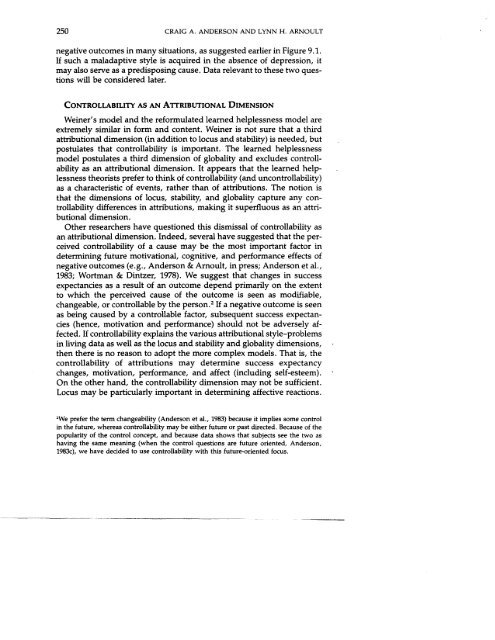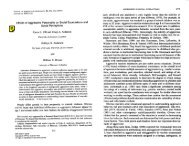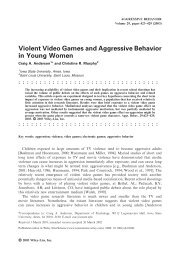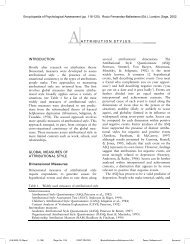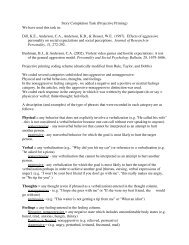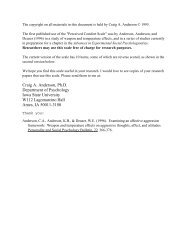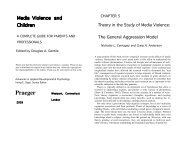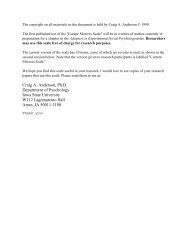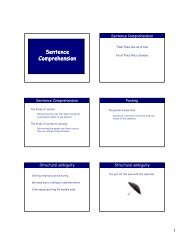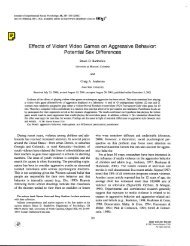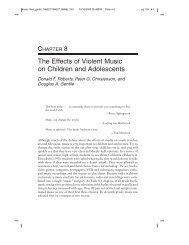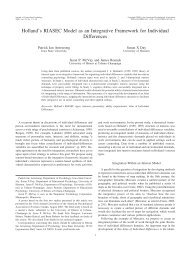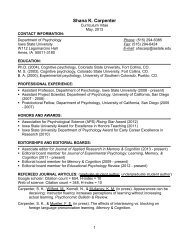Attributional Models of Depression, Loneliness, and Shyness
Attributional Models of Depression, Loneliness, and Shyness
Attributional Models of Depression, Loneliness, and Shyness
Create successful ePaper yourself
Turn your PDF publications into a flip-book with our unique Google optimized e-Paper software.
250 CRAIG A. ANDERSON AND LYNN H. ARNOULT<br />
negative outcomes in many situations, as suggested earlier in Figure 9.1.<br />
If such a maladaptive style is acquired in the absence <strong>of</strong> depression, it<br />
may also serve as a predisposing cause. Data relevant to these two questions<br />
will be considered later.<br />
CONTROLLABILITY AS AN ATTRIBUTIONAL DIMENSION<br />
Weiner's model <strong>and</strong> the reformulated learned helplessness model are<br />
extremely similar in form <strong>and</strong> content. Weiner is not sure that a third<br />
attributional dimension (in addition to locus <strong>and</strong> stability) is needed, but<br />
postulates that controllability is important. The learned helplessness<br />
model postulates a third dimension <strong>of</strong> globality <strong>and</strong> excludes controllability<br />
as an attributional dimension. It appears that the learned helplessness<br />
theorists prefer to think <strong>of</strong> controllability (<strong>and</strong> uncontrollability)<br />
as a characteristic <strong>of</strong> events, rather than <strong>of</strong> attributions. The notion is<br />
that the dimensions <strong>of</strong> locus, stability, <strong>and</strong> globality capture any controllability<br />
differences in attributions, making it superfluous as an attributional<br />
dimension.<br />
Other researchers have questioned this dismissal <strong>of</strong> controllability as<br />
an attributional dimension. Indeed, several have suggested that the perceived<br />
controllability <strong>of</strong> a cause may be the most important factor in<br />
determining future motivational, cognitive, <strong>and</strong> performance effects <strong>of</strong><br />
negative outcomes (e.g., Anderson & Arnoult, in press; Anderson et aL,<br />
1983; Wortman & Dintzer, 1978). We suggest that changes in success<br />
expectancies as a result <strong>of</strong> an outcome depend primarily on the extent<br />
to which the perceived cause <strong>of</strong> the outcome is seen as modifiable,<br />
changeable, or controllable by the person.2 If a negative outcome is seen<br />
as being caused by a controllable factor, subsequent success expectancies<br />
(hence, motivation <strong>and</strong> performance) should not be adversely affected.<br />
If controllability explains the various attributional style-problems<br />
in living data as well as the locus <strong>and</strong> stability <strong>and</strong> globality dimensions,<br />
then there is no reason to adopt the more complex models. That is, the<br />
controllability <strong>of</strong> attributions may determine success expectancy<br />
changes, motivation, performance, <strong>and</strong> affect (including self-esteem).<br />
On the other h<strong>and</strong>, the controllability dimension may not be sufficient.<br />
Locus may be particularly important in determining affective reactions.<br />
2We prefer the term changeability (Anderson et a1., 1983) because it implies some control<br />
in the future, whereas controllability may be either future or past directed. Because <strong>of</strong> the<br />
popularity <strong>of</strong> the control concept, <strong>and</strong> because data shows that subjects see the two as<br />
having the same meaning (when the control questions are future oriented, Anderson,<br />
1983c), we have decided to use controllability with this future-oriented focus.


